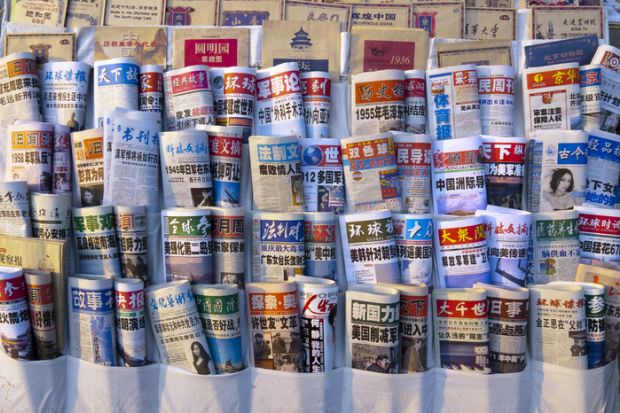Self-censorship is rife among Australia’s Chinese students and the academics who teach them, with both groups fearing repercussions if they irritate Beijing, according to advocacy group Human Rights Watch.
China experts and academics with Chinese heritage practise “regular self-censorship” when discussing the country, a new report says, while democracy-minded students live in fear of attracting Chinese authorities’ attention.
Report author Sophie McNeill, Australia researcher with Human Rights Watch, said that academic administrators wary of losing lucrative Chinese tuition fees were “turning a blind eye” to harassment and surveillance by the Chinese government and its “proxies”.
The report details objections and harassment by Chinese authorities or students between 2013 and 2018, over issues such as border depictions, the Tiananmen Square protests and addresses by the Dalai Lama, and describes escalating efforts by Chinese agencies to make overseas students report acts that “undermine Beijing’s image”.
It says that harassment, surveillance and intimidation of pro-democracy students has increased in the years since, bolstered by Zoom – which offers a new way of detecting political paraphernalia in students’ homes – and the “extraterritorial reach” of Hong Kong’s national security law.
Representative group Universities Australia said that vice-chancellors would “read this report with concern”. Chief executive Catriona Jackson said universities had “robust” policies to deal with intimidation on campuses. “We urge students to come forward to universities to report any incidents,” she said.
The report is based on interviews with 22 academics and 24 students from 16 universities. Human Rights Watch also put questions to the 16 universities, with all but two replying. The responses have been published on the organisation’s website.
“While these 24 pro-democracy students make up a miniscule proportion of the student community in Australia, their experiences speak to the challenges faced by hundreds and possibly thousands…who want the freedom to express their opinions,” the report says.
More than half the students interviewed for the report had experienced harassment or intimidation, the report says. It cites death threats and violence, with students’ personal details exposed online and parents back home visited by authorities.
The report also recounts email and social media campaigns against academics, including tutors who had defended a student pilloried for calling Taiwan a country. It describes “creeping self-censorship” by academics worried about losing access to China, drawing the authorities’ attention to Chinese relatives or colleagues, or being hung out to dry by unsupportive university administrations.
Active censorship was also becoming “increasingly normalised”, as universities discouraged public discussions or events on China-related themes.
Recommendations include an annual education department stocktake of incidents of harassment, intimidation and censorship, along with universities’ steps to “counter those threats”. Vice-chancellors should “speak out publicly” when such incidents occur, the report says, while the University Foreign Interference Taskforce should examine these matters “as a priority”.
University of Technology Sydney China specialist James Laurenceson, who was interviewed for the report, said that Chinese government threats to academic freedom and freedom of speech were significant problems. “The granular case studies in the report serve as much-needed data,” said Professor Laurenceson, director of UTS’ Australia-China Relations Institute.
But he said that all liberal democracies were grappling with the same issue. “It’s not clear to me that Australian universities are systematically lagging behind. They are more financially exposed to Chinese student dollars, but they are also subject to pressures from an Australian government that is way out in front of peer countries,” he said.
Register to continue
Why register?
- Registration is free and only takes a moment
- Once registered, you can read 3 articles a month
- Sign up for our newsletter
Subscribe
Or subscribe for unlimited access to:
- Unlimited access to news, views, insights & reviews
- Digital editions
- Digital access to THE’s university and college rankings analysis
Already registered or a current subscriber? Login








